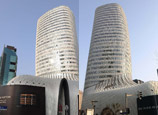
The future importance of natural gas in the country's energy mix should be prioritized, and policies should be introduced to boost its development, according to the president of China National Petroleum Corp, the nation's biggest energy company.
Zhou Jiping, a member of National Committee of the Chinese People's Political Consultative Conference, said the use of energy source has gained far bigger prominence in recent times, as China struggles with its ongoing battle against carbon emissions.
"The issue of air pollution has aroused heated discussion this year," said Zhou, adding that during the two sessions, he held meetings over such topics as accelerating natural gas exploration and pipeline construction.
He also said meetings were held about natural gas pricing mechanism reform being accelerated this year.
Zhou said China's air pollution issues are a direct result of excessive energy consumption during urbanization process.
"Similar problems occurred in developed countries in the past, and raising natural gas's share of the energy mix, in some cases making it the primary part of it, was a key solution," he said.
The most recent official figures show that natural gas accounts for about a quarter of a country's energy consumption in the developed world.
Zhou noted that Japan raised its natural gas use from 1 percent to its current 20 percent through widespread projects to replace its use of coal with natural gas.
At present, natural gas only accounts for about 5 percent of China's total energy consumption, while coal - the main cause of high carbon emission - takes up about 68.8 percent.
China consumed 147.1 billion cubic meters of natural gas over the past year, a rise of 13 percent year-on-year.
It imported 42.5 billion cubic meters, a 31.1 percent rise, according to official figures.
China will cap its energy consumption at 4 billion metric tons of standard coal, and power use of 6.15 trillion kilowatt-hours in 2015, in order to reduce carbon emissions, according to the State Council.
Energy consumption per unit of GDP will be cut by 16 percent compared with 2010 levels while energy efficiency will be raised by 38 percent.
To realize the targets, the government is encouraging the use of non-fossil fuels.
In 2012, non-fossil fuel consumption took up 9.1 percent of the energy mix in China, up 1.1 percent year-on-year, according to the Energy Research Institute under the National Development and Reform Commission.
Natural gas consumption accounted for 5.5 percent of the mix, according to the institute.
The 12th Five-Year Plan (2011-15) said the country will raise its non-fossil fuel consumption to 11.4 percent of its primary energy use by the end of 2015, with natural gas accounting for 7.5 percent.
Against this backdrop, energy firms are shifting their core business from oil to natural gas.

















 Spring comes to China. More Spring Photos: 'Fresh style' ;'Spring Style'
Spring comes to China. More Spring Photos: 'Fresh style' ;'Spring Style'


![]()
